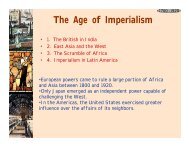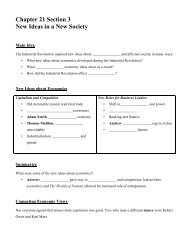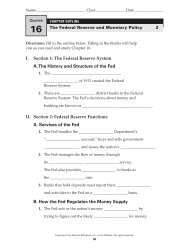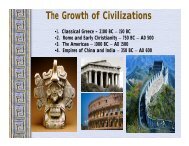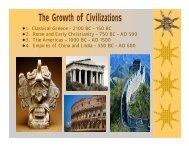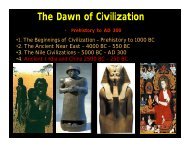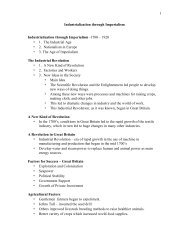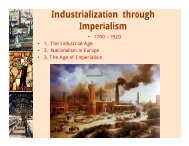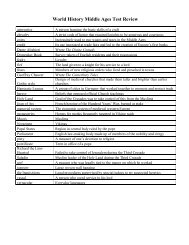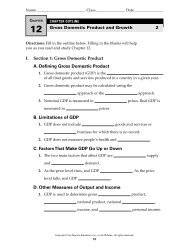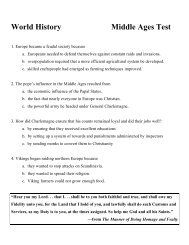President Nixon, Ford, and Carter Power Point Notes
President Nixon, Ford, and Carter Power Point Notes
President Nixon, Ford, and Carter Power Point Notes
Create successful ePaper yourself
Turn your PDF publications into a flip-book with our unique Google optimized e-Paper software.
Challenges of the 1970’s<br />
1954 - 1980<br />
1. War in Vietnam – 1954- 1975<br />
2. From <strong>Nixon</strong> ( to <strong>Ford</strong>) to<br />
<strong>Carter</strong> – 1968 - 1980<br />
•After World War Two, the United States<br />
took a very strong stance against the<br />
containment of communism anywhere in the<br />
world.<br />
•In the mid 1960’s, the United States got<br />
involved in a war with Vietnam, which had won<br />
its independence from the French in 1954.<br />
•The conflict, which lasted longer than a<br />
decade, left bitter feelings between the<br />
United States <strong>and</strong> Vietnam.<br />
1954 - 1980
From <strong>Nixon</strong> to <strong>Carter</strong><br />
1. The <strong>Nixon</strong> Years<br />
2. From Watergate to <strong>Ford</strong><br />
3. <strong>Carter</strong>: The Outsider<br />
4. Life in the 1970’s<br />
<strong>Carter</strong><br />
<strong>Nixon</strong><br />
<strong>Ford</strong><br />
1954 - 1980
1. The <strong>Nixon</strong> Years<br />
• “As I saw it, America in the<br />
1960’s had undergone a<br />
misguided crash program aimed<br />
at using the power of the<br />
presidency <strong>and</strong> the federal<br />
government to right past wrongs<br />
by trying to legislate social<br />
progress. This was the idea<br />
behind Kennedy’s New Frontier<br />
<strong>and</strong> Johnson’s Great Society.<br />
The problems were real <strong>and</strong> the<br />
intention worthy, but the<br />
method was foredoomed [bound<br />
to fail]. By the end of the<br />
decade its costs had become<br />
almost prohibitively high in<br />
terms of the way it undermined<br />
[weakened] fundamental<br />
relationships within our federal<br />
system, created confusions<br />
about our national values, <strong>and</strong><br />
corroded American belief in<br />
ourselves as a people <strong>and</strong> as a<br />
nation.”<br />
– Richard <strong>Nixon</strong>, The Memoirs of<br />
Richard <strong>Nixon</strong><br />
1954 - 1980
Courting the Silent<br />
Majority<br />
– Silent Majority -the forgotten middle<br />
class Americans who did not like the<br />
social unrest of the 1960’s.<br />
– Believed that the liberal system had<br />
made people too dependent upon the<br />
federal government.<br />
– <strong>Nixon</strong> suggested replacing the welfare<br />
system with the Family Assistance Plan,<br />
which would guarantee families a<br />
minimum income. The Senate voted the<br />
FAP down.<br />
1954 - 1980
Seeking southern support<br />
• Southern Strategy -not to<br />
ask for any new civil<br />
rights legislation to woo<br />
conservative southern<br />
white voters away from<br />
the Democratic Party.<br />
• <strong>President</strong> <strong>Nixon</strong> also<br />
appointed a conservative<br />
as chief justice of the<br />
Supreme Court. Warren<br />
Burger replaced Earl<br />
Warren as Chief Justice.<br />
Warren Burger<br />
1954 - 1980
Tackling the Economy<br />
» During the 1960’s, the United States enjoyed<br />
economic prosperity, but by the time <strong>Nixon</strong> took<br />
office, heavy government spending on the<br />
Vietnam War <strong>and</strong> social programs promoting civil<br />
rights legislation led the country into a recession.<br />
» Stagflation -rising unemployment <strong>and</strong> inflation<br />
1954 - 1980
Prices hikes<br />
– In Oct. 1973, several Arab nations cut<br />
off oil shipments to the United States<br />
as punishment in its involvement in the<br />
Arab-Israeli conflict.<br />
– Organization of Petroleum Exporting<br />
Countries (OPEC)-a group of five oil<br />
producing countries that wanted to<br />
increase oil process.<br />
– The oil embargo <strong>and</strong> the price hike<br />
triggered an energy crisis in the United<br />
States in the winter of 73 <strong>and</strong> 74.<br />
1954 - 1980
1954 - 1980
1954 - 1980
Energy policy<br />
– <strong>President</strong> <strong>Nixon</strong> called for energy conservation.<br />
– Government replaced fossil fuel with nuclear<br />
energy.<br />
1954 - 1980
Cleaning up the Environment<br />
– first Earth day -1970-Richard <strong>Nixon</strong><br />
– Environmental Protection Agency (EPA)-power<br />
to enforce environmental laws<br />
– Endangered Species Act -protect wildlife from<br />
extinction<br />
1954 - 1980
Foreign Affairs under <strong>Nixon</strong><br />
• The <strong>Nixon</strong>-Kissinger Approach<br />
– Realpolitik -practical politics-national<br />
interests rather than ideals that<br />
spread democracy <strong>and</strong> human rights<br />
should guide foreign policy<br />
– <strong>Nixon</strong> wanted to establish a balance<br />
among the five world powers.<br />
•“The only time in the history of the<br />
world that we have had any extended<br />
period of peace is when there had been a<br />
balance of power. It is when one nation<br />
becomes infinitely more powerful in<br />
relation to its potential competitors<br />
that the danger of war arises. “<br />
•Richard <strong>Nixon</strong>, Years of Discord,<br />
John Morton Blum<br />
1954 - 1980
The China Visit<br />
– <strong>President</strong> <strong>Nixon</strong> visited China (“the enemy of<br />
my enemy is my friend”). He was referring to<br />
Russia <strong>and</strong> China.<br />
– The two nations agreed to work together to<br />
promote peace in the Pacific.<br />
1954 - 1980
The Moscow Summit<br />
– <strong>Nixon</strong>, after visiting China, met with Soviet<br />
Leader Leonid Brezhnev <strong>and</strong> they both agreed<br />
to promote trade between the two nations.<br />
– Strategic Arms Limitation Talks (SALT)-treaty<br />
to limit nuclear weapons, which led to a détente<br />
-lessening of military <strong>and</strong> diplomatic tensions<br />
between the two countries.<br />
• Trouble Spots in Chile <strong>and</strong> the Middle East seemed<br />
to put détente to the test.<br />
Leonid Brezhnev<br />
1954 - 1980
2. From Watergate to <strong>Ford</strong><br />
• “<strong>Nixon</strong> had three goals: to win by<br />
the biggest electoral l<strong>and</strong>slide in<br />
history; to be remembered as a<br />
peacemaker; <strong>and</strong> to be accepted<br />
by the ‘Establishment’ as an equal.<br />
He achieved all these objectives<br />
by the end of 1972 <strong>and</strong> the<br />
beginning of 1973. And he lost<br />
them all two months later-partly<br />
because he turned a dream into<br />
an obsession.<br />
• Henry Kissinger, Years of<br />
Upheaval<br />
1954 - 1980
Crisis in the Presidency<br />
• No limits on a president’s power<br />
• Dark Secrets<br />
– 1971-<strong>Nixon</strong>-told his staff to compile an “enemies<br />
list” of critics as well as organized a group of<br />
“plumbers” to stop leaks <strong>and</strong> to carry out a<br />
variety of illegal actions in the name of national<br />
security.<br />
– June- 5 men were caught with wiretap equipment<br />
<strong>and</strong> spying devices breaking into the offices of<br />
the Democratic National Committee in the<br />
Watergate office in D.C.<br />
– Funded by <strong>Nixon</strong>’s campaign Committee to Re-elect the<br />
<strong>President</strong><br />
– Washington Post Bob Woodward <strong>and</strong> Carl Bernstein<br />
received information from “Deep Throat,” <strong>and</strong> informant in<br />
the federal government. They leaked the information to<br />
the public.<br />
Bob Woodward<br />
Carl Bernstein<br />
1954 - 1980
The investigation<br />
• Despite the Watergate sc<strong>and</strong>al, <strong>Nixon</strong> was re-elected in 1972 by a<br />
l<strong>and</strong>slide.<br />
• Spring of 1973, the executive <strong>and</strong> the legislative branch began their<br />
investigations into the sc<strong>and</strong>al.<br />
» Senator Sam Ervin led an investigation of a sc<strong>and</strong>al<br />
know as Watergate<br />
» James McCord, a former CIA agent who was<br />
involved in the break-in had linked the cover-up to<br />
“the very highest levels of the White House.”<br />
» May 1973, the Senate trials were televised <strong>and</strong><br />
several top officials were eventually convicted <strong>and</strong><br />
jailed.<br />
» Was the president involved? John Dean, White<br />
House attorney, said that he was involved <strong>and</strong><br />
another witness said that there were White House<br />
recordings to prove it.<br />
Senator Sam Ervin<br />
1954 - 1980
1954 - 1980
The <strong>Nixon</strong> Resignation<br />
• The White House Tapes<br />
– Justice Department special prosecutor<br />
Archibald Cox dem<strong>and</strong>ed that the<br />
president h<strong>and</strong> over the tapes. <strong>Nixon</strong><br />
refused citing “executive privilege.”<br />
– Vice <strong>President</strong> Spiro Agnew, at the<br />
same time, was charged with tax<br />
evasion <strong>and</strong> resigned. <strong>Nixon</strong> appointed<br />
the Republican leader in the House of<br />
Representatives, Gerald <strong>Ford</strong>, as his<br />
Archibald Cox<br />
vice president.<br />
Spiro Agnew<br />
1954 - 1980
Saturday Massacre<br />
– <strong>President</strong> <strong>Nixon</strong>, after refusing to h<strong>and</strong> in the<br />
recordings once again, dem<strong>and</strong>ed that Attorney<br />
General Elliot Richardson fire Archibald Cox.<br />
– Both the Attorney General <strong>and</strong> the Deputy<br />
Attorney General resigned rather than fire<br />
Cox.<br />
– Solicitor General Robert Bark complied.<br />
– Outraged, the public led to calls of<br />
impeachment.<br />
1954 - 1980
Final Days<br />
• Not until July 1974, when the Supreme Court<br />
rejected executive privilege, did <strong>Nixon</strong> h<strong>and</strong> over<br />
the tapes.<br />
• With release of the tapes, America discovered the<br />
truth.<br />
• Vice <strong>President</strong> Gerald <strong>Ford</strong> was sworn in as<br />
president. It was the first the president <strong>and</strong> the<br />
vice president were appointed <strong>and</strong> not elected.<br />
1954 - 1980
<strong>Ford</strong> Tries to Reunite the<br />
• Pardon <strong>and</strong> clemency<br />
Nation<br />
– September, 1974 Gerald <strong>Ford</strong> granted<br />
<strong>Nixon</strong> a full pardon.<br />
– Later, he also granted pardons to draft<br />
evaders in exchange for 2 years of<br />
community service.<br />
– <strong>Ford</strong>’s approval rating dropped from<br />
71% to 505 as a result.<br />
•“We knew the clemency was proclaimed<br />
just to offset [make up for] the <strong>Nixon</strong><br />
pardon, which was an insult. We weren’t<br />
criminals, <strong>and</strong> <strong>Nixon</strong> was, but <strong>Ford</strong> proposed<br />
to pardon <strong>Nixon</strong> unconditionally while<br />
offering ‘alternative punishment’ to us.”<br />
•Dee Knight, From Camelot to Kent<br />
State, Joan <strong>and</strong> Robert Morrison<br />
1954 - 1980
1954 - 1980
1954 - 1980
Trouble continues<br />
– The Democratic Party won control of both<br />
houses <strong>and</strong> tried to pass social welfare<br />
legislation.<br />
– <strong>President</strong> <strong>Ford</strong> vetoed 66 bills in his short<br />
term, more than any other president.<br />
1954 - 1980
<strong>Ford</strong>’s Foreign Policy<br />
• Asia<br />
– Henry Kissinger stayed on as secretary<br />
of state <strong>and</strong> Gerald <strong>Ford</strong> practiced<br />
détente.<br />
– The Mayaguez incident, May 1975-<br />
Cambodian Communists captured an<br />
unarmed U.S. Cargo ship <strong>and</strong> took the<br />
crew captive.<br />
• <strong>President</strong> <strong>Ford</strong> sent the military to get the<br />
crew <strong>and</strong> eventually the crew had been<br />
released.<br />
• <strong>Ford</strong>’s approval rating climbed despite some<br />
opposition.<br />
1954 - 1980
1954 - 1980
The Cold War continues<br />
– Communism in Angola, Africa -the popular front<br />
– <strong>Ford</strong> authorized a secret funding to the<br />
national front but when Congress found out, the<br />
Senate ordered <strong>Ford</strong> to stop immediately.<br />
1954 - 1980
3. <strong>Carter</strong>: The Outsider<br />
• <strong>Carter</strong> has figured out a<br />
couple of very important<br />
things. What national<br />
leaders <strong>and</strong> other<br />
c<strong>and</strong>idates perceive as a<br />
political crisis is actually<br />
a spiritual crisis, <strong>and</strong> that<br />
more symbolic<br />
communication is the best<br />
way to reach Americans<br />
drifting in an atmosphere<br />
saturated with instant<br />
communication.”<br />
– Richard Reeves, New York<br />
Magazine, March 1976<br />
1954 - 1980
The Election of 1976<br />
» Republicans nominated Gerald <strong>Ford</strong><br />
<strong>and</strong> Bob Dole as his running mate.<br />
» Democrats nominated Jimmy <strong>Carter</strong><br />
<strong>and</strong> Walter Mondale as his running<br />
mate.<br />
1954 - 1980
1954 - 1980
<strong>Carter</strong>’s Domestic Agenda<br />
• Economic Policy<br />
– <strong>Carter</strong> issued a tax cut to stimulate the<br />
economy <strong>and</strong> tried an anti-inflation<br />
program, but it failed to slow inflation<br />
<strong>and</strong> created more unemployment.<br />
– By 1980, the economy was in a recession<br />
once again.<br />
1954 - 1980
Facing the energy crisis<br />
• National Energy Act -created as a result of the oil<br />
crisis of the late 1970’s.<br />
• Department of Energy -1977-created to oversee<br />
energy issues.<br />
• Three Miles Isl<strong>and</strong> Accident -nuclear reactor failed in<br />
Pennsylvania <strong>and</strong> almost caused a catastrophic<br />
meltdown. “We cannot simply shut down our nuclear<br />
power plants.”<br />
• A loss of faith -With the nation facing recession, Americans lost<br />
confidence in <strong>Carter</strong>’s leadership.<br />
•“I want to talk to you right now about a<br />
fundamental threat to American democracy<br />
. . . . In a nation that was once proud of hard<br />
work, strong families, close-knit communities,<br />
<strong>and</strong> our faith in God, too many of us now tend<br />
to worship self-indulgence [pampering] <strong>and</strong><br />
consumption.” Jimmy <strong>Carter</strong>, speech, July 15,<br />
1979<br />
1954 - 1980
1954 - 1980
1954 - 1980
1954 - 1980
A New Foreign Policy<br />
• Morality into United States foreign policy-strong<br />
diplomacy <strong>and</strong> economic pressure on any countries<br />
that violated human rights.<br />
•“We are deeply concerned . . . By the . . . Subtle<br />
erosion in the focus <strong>and</strong> morality of our foreign<br />
policy. Under the <strong>Nixon</strong>-<strong>Ford</strong> administration, there<br />
has evolved a kind of secretive ‘Lone Ranger’ foreign<br />
policy-a one-man policy of international adventure.<br />
This is not an appropriate policy for America.”<br />
•Jimmy <strong>Carter</strong>, speech, June, 1976<br />
1954 - 1980
The Panama Canal<br />
– Panama Canal Treaties -granted control of<br />
canal operations to Panama by the year<br />
2000.<br />
– Helped to improve the image of the United<br />
States <strong>and</strong> diminish appeal of communism<br />
1954 - 1980
Africa<br />
– The United States <strong>and</strong> the Soviet Union<br />
competed over influence in Africa.<br />
– Apartheid -white minority ruled <strong>and</strong> black<br />
majority had fewer rights.<br />
1954 - 1980
U.S. Soviet Relations<br />
– United States <strong>and</strong> the Soviet relationship<br />
reached a low point.<br />
– Soviets invaded Afghanistan <strong>and</strong> as a result we<br />
refused to participate in the Olympics in the<br />
Soviet Union in 1980.<br />
1954 - 1980
<strong>Carter</strong> <strong>and</strong> the Middle East<br />
– <strong>Carter</strong>’s Foreign Policy -triumph; one of his<br />
greater achievements.<br />
– Egyptian-Israeli armed conflict which led to<br />
Camp David Accords. <strong>President</strong> <strong>Carter</strong> met<br />
with Egyptian Anwar Sadat <strong>and</strong> Israeli Prime<br />
Minister Menachem Begin <strong>and</strong> negotiated peace<br />
that ended 30 years state of war.<br />
1954 - 1980
Anwar Sadat<br />
<strong>Carter</strong><br />
Menachem Begin<br />
1954 - 1980
4. Life in the 1970’s<br />
• “Did the way in which Americans commemorated the nation’s<br />
200th birthday contribute to the American dream embodied<br />
in the Declaration of Independence, the Constitution, <strong>and</strong><br />
the Bill of Rights? Having witnesses, along with all other<br />
Americans, the renewed spirit of dedication, patriotism <strong>and</strong><br />
friendship that flowed across the l<strong>and</strong> on the Bicentennial<br />
weekend, it seems to me that the answer is an unqualified<br />
[without reservation] yes. Americans used the Bicentennial<br />
to renew their faith in themselves, to gain knowledge <strong>and</strong><br />
underst<strong>and</strong>ing of their neighbors, <strong>and</strong> to begin again the<br />
quest for liberty, justice, <strong>and</strong> equality for all.”<br />
– Edward W. Brooke, The Bicentennial of the United<br />
States of America<br />
1954 - 1980
A Changing Population<br />
• Immigration<br />
– 1970’s-the United States population<br />
affected by Asian <strong>and</strong> Latin American<br />
migration.<br />
– Voting Rights Acts of 1975 -required<br />
states <strong>and</strong> communities with a large<br />
number of non-English-speaking<br />
residents to print voting materials in<br />
foreign languages.<br />
1954 - 1980
Rise of sunbelt<br />
• States of the south <strong>and</strong> the west<br />
(California, Florida, Texas)<br />
• The attraction of living in the suburbs led<br />
to an increase in the population in the<br />
Sunbelt.<br />
1954 - 1980
Family life<br />
– End of the 1970’s the idea of the “average<br />
family” changed.<br />
– An increase in divorce <strong>and</strong> people waited until<br />
later to remarry.<br />
1954 - 1980
American Attitudes<br />
• Improving the self<br />
• Fitness <strong>and</strong> food<br />
– Self-actualization movement -looking<br />
for ways to improve yourself (Yoga,<br />
Meditation)<br />
– Non traditional religious groups<br />
• Physical fitness -health spas <strong>and</strong> tennis clubs<br />
• Nutrition <strong>and</strong> improved diet<br />
1954 - 1980
Entertainment<br />
• During the 1970’s, Americans spent more money<br />
than ever before on music <strong>and</strong> motion pictures.<br />
1954 - 1980
Movies<br />
• 1970’s-boom in the motion picture industry<br />
• Steven Spielberg -Jaws, Schlinder’s List,<br />
ET, Saving Private Ryan<br />
•“Fear is a very real thing for me. One of the best ways to<br />
cope with it is to turn it around <strong>and</strong> put it out to others. I<br />
mean, if you are afraid of the dark, you put the audience in a<br />
dark theater. I had a great fear of the ocean.”<br />
•Steven Spielberg, Steven Spielberg, by Joseph McBride<br />
ET phone home!<br />
1954 - 1980
Music<br />
• 1970’s-Rock music changes. Changes from<br />
counterculture to a big business.<br />
• Rock n Roll was replaced by disco <strong>and</strong> punk<br />
rock.<br />
1954 - 1980
1954 - 1980
Technological Advances<br />
• Sophistical technological developments changed the<br />
way that Americans viewed the universe. Other<br />
innovations of the 1970s would eventually change<br />
the ways that Americans worked, played, <strong>and</strong><br />
communicated.<br />
1954 - 1980
The Space Program<br />
• July 20, 1969-Apollo 11-lunar module l<strong>and</strong>ed<br />
on the Moon- Neil Armstrong <strong>and</strong> Edwin<br />
“Buzz” Aldwin<br />
• Skylab -first United States Space Station<br />
1954 - 1980
1954 - 1980
We read the newspaper<br />
back then!<br />
1954 - 1980
Innovations<br />
• Apple Computer -Steven Jobs <strong>and</strong> Stephen<br />
Wozniak-two college dropouts founded<br />
Apple Company (PC)<br />
• Atari games <strong>and</strong> Videocassette Recordings<br />
(VCR)<br />
• VCR is now replaced by horrible DVD<br />
1954 - 1980
1954 - 1980
1954 - 1980



